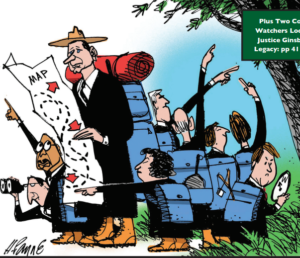The Volokh Conspiracy
Mostly law professors | Sometimes contrarian | Often libertarian | Always independent
Environmental Law in the Roberts Court
The Supreme Court decides a decent number of environmental cases, but does not seem particularly interested in environmental concerns.
Environmental law constitutes a decent sliver of the Supreme Court's caseload, but none of the current justices seems to have much interest in environmental law, as such -- or so I argue in my new article, "Which Way for the Roberts Court?", the cover story for the November/December 2020 issue of The Environmental Forum, published by the Environmental Law Institute.

Here is a taste of the article:
In many respects, the 2019-20 Supreme Court term encapsulates the Roberts Court's treatment of environmental issues. In a majority of cases, the position supported by environmental groups fails. On the other hand, positions favored by business groups
or the federal government tend to succeed. Looking behind the numbers, however, reveals two equally important tendencies. First, the Court seems to lack much interest in the distinct environmental content of environmental law cases. Second, the justices do not perceive environmental law as uniquely distinct or even important. Nonetheless, the most significant and far-reaching environmental law cases before the Court have been the ones in which environmentalist groups have been most likely to prevail. One question is whether this pattern will hold once a new justice replaces the late Ruth Bader Ginsburg on the Court. . . .The substance of the Court's environmental law decisions confirms what the language of the opinions would suggest: The Court does not really view environmental law cases as environmental cases. That is, the Court does not view environmental law as a distinct field of law, nor do the justices evince any recognition that environmental questions may require viewing traditional doctrines through a green lens. The Roberts Court, like its immediate predecessors, has shown little affinity for ecological values or the idea than environmental law is a distinct area of law raising distinct concerns.
The justices tend to focus on the underlying legal questions, not the ecological concerns that may have led policymakers to adopt a given regulation or environmental groups to file suit. If the case involves how a statute should be interpreted, the justices will focus on statutory interpretation. If it centers on a question of administrative procedure, then the justice's respective doctrinal commitments on questions of administrative law will drive the decision. And so on. Ecological considerations are, at best, window dressing, and do not provide the rules of decision. The justices are more concerned about how to read a statute or limits on federal regulatory authority, writ large, than they are on the ecological dimensions of their decisions. This creates challenges to environmental advocates but it may also create opportunities.
The article was largely completed before Justice Ginsburg's passing, but I think the underlying thesis holds. Her death does not affect my assessment of the past fifteen years, but her potential replacement could definitely affect the course of environmental law at the Supreme Court in the future.
The full cover package includes a few sidebars by Professors Lisa Heinzerling, Robert Percival, and Amanda Leiter, providing additional perspectives on environmental law on the Court, and Justice Ginsburg's environmental law legacy.


Show Comments (16)